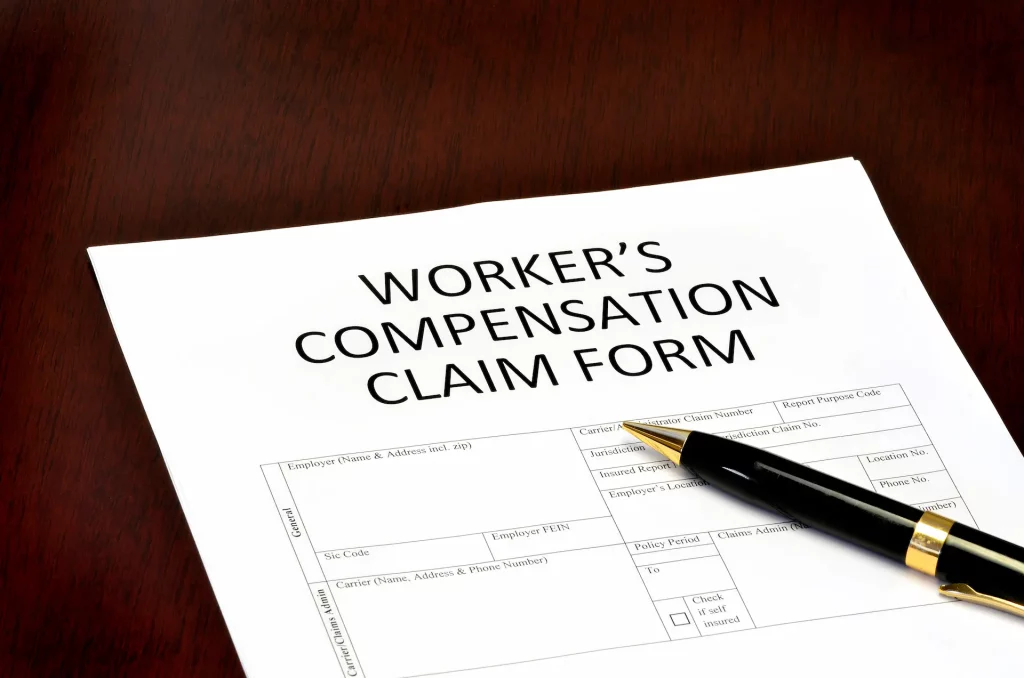Workers’ Compensation vs. Personal Injury Law: 5 Key Differences

What are the differences between workers’ compensation and personal injury in the state of Texas? It’s an important question; understanding the differences between workers comp and personal injury law can help you understand your options after an accident or a workplace injury.
Workers comp is a form of insurance that covers medical expenses and lost wages because of an on-the-job injury or illness. Personal injury, however, typically refers to a type of claim that can be made against a person or entity because of negligence or other wrongful conduct that causes an injury.
But, as with any legal explanation, there’s more to it. Keep reading as we explore the five key differences between workers’ comp and personal injury law. Let’s get started.
The Difference Between Workers’ Compensation and Personal Injury in the state of Texas
Distinguishing between a personal injury lawsuit and a workers’ compensation claim can be challenging.
While there are several differentiating factors to distinguish the two types of cases, there are two main provisions that separate workers’ compensation claims and personal Injury cases:
- Fault requirement
- Compensation available
The primary distinction between the two is that personal injury claims rely on fault, whereas worker’s compensation cases do not require anyone to be found at fault and are typically handled by an insurance company. To receive compensation in a personal injury case, you and your lawyer must prove that the at-fault party caused or contributed to the injury. A personal injury claim is typically based on negligence, or in instances involving a defective product, it may be based on strict liability.
Workers Comp. vs. Personal Injury: 5 Key Differences
| Workers Comp | Personal Injury | |
| Fault vs. No-Fault Required | No fault required | Fault Required |
| Pain and Suffering Damages | No benefits for pain and suffering | Can recover damages for pain and suffering, mental anguish, physical impairment, and possibly more |
| The Ability to File a Lawsuit | The claim is handled through the workers’ compensation insurance company or its third party administrator | Right to file a lawsuit |
| Filing Limitations | Limited to employees. In cases involving a death, however, a spouse and children can receive benefits | The injured person can file a lawsuit. In addition, family members may be able to join in the lawsuit depending on the facts of the case. |
| Filing Deadlines | Injury reports must be filed within 30 days of an injury occurring | As a general rule, the lawsuit must be filed within two years of the incident/injury. |

Let’s unpack the differences between workers’ comp and personal injury cases:
1. Fault vs. No-Fault Required
If you get injured while on the job, you can receive workers’ compensation benefits regardless of who is at fault. Even if your own negligence caused the injury, you should still be able to receive compensation because workers’ compensation protects workers who get injured while performing their job duties, regardless of fault. After all, if you weren’t at work, you wouldn’t have been injured in the first place.
To file a personal injury lawsuit, on the other hand, you must prove someone was negligent or otherwise at fault for your injuries. For example, if you were injured in a car accident or truck accident, you need to prove that the negligence of the at-fault driver caused or contributed to the crash and your injuries.
2. Pain and Suffering Damages
In Texas, the workers’ compensation program covers all authorized medical costs and should provide 70% of your pre-injury weekly income. This will be a part of your workers’ compensation claim, and not only should you receive benefits for your medical bills and 70% of your pre-injury weekly injuries, but you may also be compensated for any permanent impairment resulting from the injury.
You will not, however, be entitled to reimbursements for pain and suffering as part of this claim.
On the other hand, If you have a personal injury claim, you may be entitled to receive compensation for all the harm that has been done to you—including medical care expenses, lost income, pain, mental anguish, physical impairment, and potentially more.
Texas law allows personal injury claimants to seek the following non-economic damages:
- Physical impairment
- Pain and suffering
- Mental anguish
- Loss of companionship and society
- Loss of consortium
- Loss of enjoyment of life
- Disfigurement
A judge will reduce your damages if you are found to be partially responsible for causing the accident, and if you are more than 50% at fault, you will not receive any damages.
3. The Ability to File a Lawsuit
If the facts of your case support a personal injury claim, you can take action right away by filing a lawsuit in Texas state court or in federal court. On the other hand, workers’ compensation claims are handled by the Texas Department of Insurance.
In many instances a personal injury lawsuit can be filed even if your injury happened at work. Instances where this can result include the following:
- In Texas, if your employer does not carry workers’ compensation insurance and you were injured on the job, you may be able to file a lawsuit against your employer base on negligence. In this instance, the employer is known as a “non-subscriber”.
- If you were injured on the job because of the negligence of a third-party (a different company that was not your employer or one of its employees), you may be able to file a third-party lawsuit against the at-fault company.
- If you were injured on the job because of a defective product, you may be able to file a product liability lawsuit based on negligence and strict liability against the product manufacturer, marketer, seller or distributor.
- If an employee suffers a fatal injury on the job, the surviving spouse and children may file a lawsuit against the employer based on “gross negligence.”
4. Filing Limitations
Workers’ compensation claims are limited to employees of the company. And if your employer had workers’ compensation insurance at the time of your on the job injury, as a general rule you are not permitted to sue your employer for its negligence that caused your injuries and damages.
Personal injury claims and lawsuits can be brought against a person or entity whose wrongful actions or inactions caused injuries and damages.
It is noteworthy that in the state of Texas, employers are not required to carry workers’ compensation coverage which means they can be sued for negligence by an injured employee. In other words, if your company does not have workers’ compensation insurance and you were injured on the job because of the negligence of your employer or a co-worker, you likely have the right to file a personal injury lawsuit against your employer.
5. Filing Deadlines
As a general rule, in the state of Texas a personal injury claim based on negligence must be either settled or a proper lawsuit must be filed within two years of the incident/negligence/injury, or the claimant will forever lose the right to make the claim. There are exceptions to this rule which is why it is critical to consult with a qualified personal injury attorney to determine the unique time limitations for each and every claim.
Workers’ compensation claims have a much shorter deadline. As a general rule, a claimant must provide proper notice with his/her employer within 30 days after an injury occurs, and a proper appeal for the first impairment rating within 90 days of its issue date. And as a general rule a formal workers’ compensation claim must be filed within the first year of the injury date. There can be exceptions to these rules depending on the facts of the case which is why it is critical to consult with a qualified workers’ compensation attorney or personal injury attorney to determine the unique time limitations for each and every claim.
Now that we’ve taken a general overview of the differences between workers’ compensation claims and personal injury cases, let’s look at the definitions of each – they could help clear up any remaining questions you may still have. And if you’re still feeling like you’re swimming in muddy water, you should consult with an experienced personal injury lawyer who can provide you with the guidance you need to understand your rights and critical deadlines.
What is Workers’ Compensation?
Workers’ compensation is financial compensation paid to an employee who sustains an injury while on the job, regardless of who was at fault. Because workers’ compensation claims do not involve assigning blame for workplace accidents, these cases can typically be processed more quickly than those involving personal injuries. The benefits available in a workers’ compensation claim are limited.
What is Personal Injury?
A “personal injury” claim is a claim for injuries and damages as a result of the negligence or other wrongful action or inaction by another person or entity.
In a personal injury claim, you can seek compensation for medical care expenses, lost wages, pain, mental anguish, physical impairment, disfigurement, and potentially more.
Conclusion: Do You Need Help With Your Case?
Personal injury cases and workers’ compensation claims are two different kinds of legal cases, but both can help you get compensation.
Workers’ compensation works more like an insurance claim with no assigning of fault and is typically handled by the Texas Department of Insurance, whereas a personal injury claim can result in a lawsuit that could eventually lead to a courtroom with a judge and jury to decide over your case. In a personal injury lawsuit, you will have to prove the defendant acted in such a way as to cause your injury for you to win.
While it can be hard to understand how the law applies to your case without professional help, an experienced personal injury lawyer can navigate these tricky waters on your behalf.
It is important to seek counsel before filing a claim—whether it’s a personal injury claim, workers’ compensation, or potentially a combination of the two. Feel free to reach out and schedule a FREE consultation with us today.
FAQ
Q: Is workers comp required in Texas?
A: Although it is not required in the state of Texas that private employers carry workers’ compensation insurance, employers who enter contracts with governmental entities are generally required to provide workers’ comp for their employees working on the project.
Q: What is personal injury in Texas?
A: Texas personal injury claims can arise from almost any kind of harm caused by negligence or wrongful conduct, including car accidents, truck accidents, workplace accidents, and defective products, to name just a few examples.
Q: What does workers comp cover in Texas?
Workers’ compensation pays for benefits like medical care to treat an injured employee who was injured or became ill while on the job or because of the job. It can also pay for a percentage of lost income. If an employee dies because of a work-related injury or illness, it pays additional benefits such as burial expenses and limited benefits to the employee’s family.

Michael S Callahan is an attorney and founder of The Callahan Law Firm. He focuses his practice on representing individuals and families in personal injury cases involving motor vehicle and truck accidents, workplace accidents and defective products. With over 25 years of experience, he is dedicated to fighting on behalf of people whose lives have been forever altered by the negligence and carelessness of corporations and individuals. Originally trained as a mechanical engineer, Michael has been practicing law and fighting for justice for those who need it most since 1994. He is board-certified in Personal Injury Trial Law by the Texas Board of Legal Specialization and a member of various esteemed legal associations. Outside of work, Michael enjoys spending quality time with his family, outdoor activities, and continually striving to improve as a trial lawyer and human being.











